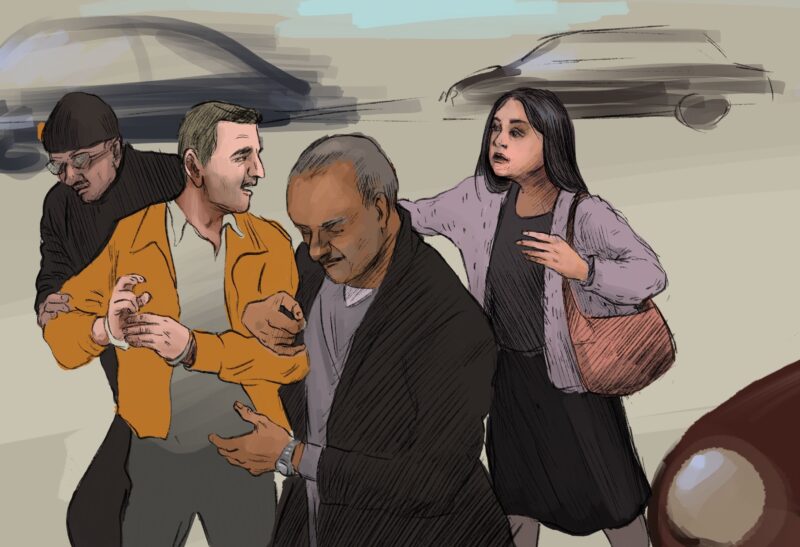Ismayil Abdullayev, a well-known football commentator in Azerbaijan, paid the price for a racist joke he made on air and sparked major debates about whether racism exists in Azerbaijan.
A one-month ban
During a live broadcast of a Premier League match, a television commentator narrated a move by Chelsea's N'Golo Kanté, saying, “Kanté went back, threw himself into the fire (a saying in Azerbaijani), but did not burn”. The other commentator, Abdullayev, responded, “even if he had burnt, his color would not have changed”.
Members of Chelsea's Azerbaijan fan club were the first to react to the racist joke. They posted a statement to their official Facebook page, expressing hope that “something like this will never happen again”. Then, Abdullayev was slammed on social media. A short time later, the commentator was suspended from work for a month.
The channel's management, however, did not comment on the incident at all. Abdullayev himself announced his suspension in a post on his Instagram page, writing, “Rejoice, people!!! I will not be on air for a month. I do not know if I will be back”.
This was Azerbaijan's first sanction due to racism. It is not, however, the only manifestation of racism in the media.
In 2016, a local television channel fired a black weather forecaster. The official reason it cited was that her command of Azerbaijani was not good enough. Members of the public, however, thought that the true reason for the lady's dismissal was an article published by the newspaper "Azarbaycan". The article, titled "Azeri beauty who arrived from Africa", slammed the channel for entrusting the weather forecast to someone black. The author of the article believed that this was "
bad taste and indifference to the beauty of Azerbaijani women and apostasy from them
".
"He is not black. He is Jose Bernardo"
However, another black host, Jose Bernardo, who worked for a local television channel for three years, said in an interview that it was his appearance on the TV screen that put an end to offensive racist mockery that he had heard from his early childhood.
"I was walking in the street, and a boy and his mother were walking toward me. The boy told his mother: 'Wow, mom, look at that black guy', to which the mother responded: 'He is not black. He is Jose Bernardo'," Bernardo said in the interview.
Jose Bernardo was born and raised in Azerbaijan. His mother is Azerbaijani, his father is Cuban. He is fluent in Azerbaijani and fairly well-known in the country. However, this didn’t change experiences in his personal life. Jose believes that he “fell victim to the mentality” of his girlfriend and that it was because of his skin color that she rejected him.
Multiculturalism “in color”
The Azerbaijani constitution bans racial discrimination.
Azerbaijani officials often emphasize the country's tolerance and argue that all ethnic groups in it live in friendship and harmony. At numerous state events devoted to multiculturalism, the government particularly stresses that there is no racism or xenophobia in the country and that there are equal opportunities for all ethnic groups.
But what do people of different races think – have they ever encountered racism during their life in Azerbaijan?
"Some hate the Arabs. I do not know if this is the case or is it just how I see it. But when I am trying to talk to them, they either do not respond or act very weirdly," a man from Saudi Arabia told us.
He said he had the feeling that people in Azerbaijan were aggressive toward him, as if they wanted to start a fight. He thinks this is because of his ethnicity.
A student from Nigeria said that there is discrimination all around the world, "and you, as a foreigner, should not pay attention to locals discriminating against you".
"I simply laugh and walk on," he added.
"They stare at you in Azerbaijan"
Sociologist Nail Jalil says that racism and xenophobia exist in Azerbaijan, albeit they do not always take a dramatic form.
"For example, people in this country will not adopt mixed-race or black children. This is not acceptable from [the local people's] point of view."
The sociologist believes that work to combat racism should be carried out in the country.
“It is important to regulate people's activities by means of legislation – through education and sometimes through public condemnation”, he says.
Farhad Mehdiyev, a law professor, does not think that racism in Azerbaijan is a priority problem, but he notes individual cases, saying that ,“this often happens on social media, for example, people write derogatory remarks about tourists of Arab origin.”
This question was asked on a foreign travel website: “What is the attitude towards black people and Asians in Azerbaijan?"
A user who said he was from the United Arab Emirates wrote that, “in Azerbaijan, when they see that you are not a local, they stare at you. But I never encountered racial discrimination. Just be prepared to accept the fact that local people have a different lifestyle, gestures and actions, which means that it is up to you to decide whether those gestures or actions are racist. Overall, most people are polite and friendly."
What should someone encountering
racism do?
Farhad Mehdiyev says that a lawsuit can be filed for a racist statement on social media.
"In this case, the judge is forced to rule in favor of the plaintif, because it really is discrimination, and discrimination is prohibited."
Farhad Mehdiyev also says that "the prohibition of racial discrimination is mandatory and nobody can cite, for example, freedom of expression" as it sometimes happens in Azerbaijan:
"This is one of the rights that the concept of universal freedom gave people. I may not like someone. For example, I can say that, suppose, I do not like Arabs or that I do not like the English. I do not have to love them. A free person may not love everyone; he or she chooses who to love and who not to love. But the law indicates where you cannot discriminate against people. If, for example, I own a restaurant or a shop or I am a hairdresser and I provide services, in no case can I refuse to provide services to someone on the basis of racial discrimination. This is unacceptable."



